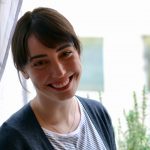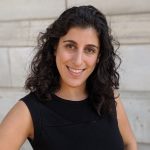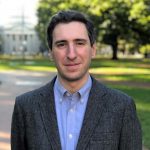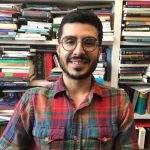Since 2012-2013, the Center has offered one Carolina graduate student a yearlong fellowship to support their dissertation research and writing. The fellowship allows the students to focus entirely on their dissertation, which improves the quality of the work and also helps ensure a timely progression to completion. This fellowship has been made possible by generous donations to the Center—including multiple, short-term expendable gifts and limited unrestricted funds—and is a unique opportunity for students to receive a full year of support during their later years at Carolina.
The Center has supported talented scholars with a wide range of dissertation topics ranging from late Roman and Byzantine pottery,
to post-war economics of Soviet Jewish communities, to medicine and politics for physicians in Israel.
Currently, the Center seeks a permanent endowment or long-term expendable fund to support this fellowship annually.
“For 10 years we have made this fellowship a top priority at the Center, which often means directing our limited unrestricted funds to this purpose,” added Ruth von Bernuth, director. “As the Center approaches its 20th, and then 25th anniversaries, we would love to have a permanent source of funding for this fellowship so that there is never any hesitation or concern about offering this truly meaningful opportunity to a highly-promising graduate student.”
Please contact us for additional information at jewishstudies@unc.edu.
Meet some of the grad students who have been awarded the yearlong fellowship:
The Center’s first ever fellow was Naomi Graber, then a Ph.D. candidate in the department of music, who was working on her dissertation titled, “Found in Translati on: Kurt Weill on Broadway and in Hollywood, 1935–1939.”
on: Kurt Weill on Broadway and in Hollywood, 1935–1939.”
“The fellowship meant a great deal to me. It gave me the time I needed to complete my dissertation, including research that led to my first journal article. That article led to a temporary academic position, which has since become permanent,” said Graber. “I will always be grateful to the Carolina Center for Jewish Studies for providing the support I needed early in my career.”
Graber’s dissertation earned her the Glen Haydon Award for an Outstanding Dissertation in Musicology and she is currently writing a book on Kurt Weill’s American career, which is forthcoming with Oxford University Press. She joined the faculty of University of Georgia in 2013.
Each subsequent year, the Center has supported equally talented scholars with a wide range of dissertation topics ranging from late Roman and Byzantine pottery, to post-war economics of Soviet Jewish communities, to medicine and politics for physicians in Israel.
 In 2017-2018, Robin Buller, department of history, earned the fellowship and spent the year conducting research for her dissertation which examines Ottoman Sephardi immigrants in Paris during the interwar period and the Holocaust.
In 2017-2018, Robin Buller, department of history, earned the fellowship and spent the year conducting research for her dissertation which examines Ottoman Sephardi immigrants in Paris during the interwar period and the Holocaust.
“The Center’s dissertation completion fellowship transformed the course of my research. Thanks to the fellowship’s support, I was able to spend a full year digging through archives in Paris,” said Buller. “That progress paid dividends and was instrumental in my ability to secure external funding.”
After the year with our fellowship support, Buller earned several other prestigious fellowships, most recently from the Association for Jewish Studies. She plans to defend her dissertation this spring and has accepted a post-doc position at University of California, Berkeley starting in the fall.
 Two years ago, Bradley Erickson, religious studies, held the fellowship in support of his extensive work in the digital humanities.
Two years ago, Bradley Erickson, religious studies, held the fellowship in support of his extensive work in the digital humanities.
“The dissertation fellowship not only provided the time and resources for the completion of my dissertation, but it helped me make connections in the field that led to multiple conference presentations and the publication of two articles exploring the use of digital humanities in the field of Jewish studies,” noted Erickson.
In 2019-2020, Daniela R. P. Weiner held the fellowship and then promptly defended her dissertation in  the summer of 2020. She now holds a prestigious post-doc position with the Graduate School of Education at Stanford University.
the summer of 2020. She now holds a prestigious post-doc position with the Graduate School of Education at Stanford University.
“The completion fellowship allowed me to finish my Ph.D. degree significantly faster than I would have been able to otherwise. I was able to work on writing my dissertation essentially full-time during my last year at Carolina,” said Weiner.
Currently, Max Lazar, department of history, holds the fellowship, and he plans to defend his dissertation—which is a local study of Jewish integration in Frankfurt am Main between 1914 and 1938—this semester before embarking on a teaching career.
Max Lazar, department of history, holds the fellowship, and he plans to defend his dissertation—which is a local study of Jewish integration in Frankfurt am Main between 1914 and 1938—this semester before embarking on a teaching career.
“In a time of great uncertainty, the Goodman Dissertation Fellowship has provided me with one of the rarest resources one can find: time,” said Lazar. “There is no doubt that my dissertation has grown in quality thanks to this opportunity from the Carolina Center for Jewish Studies.”
 Next academic year, Miguel Vargas, department of religious studies, will hold the fellowship to focus on his dissertation which examines the history, historical consciousness and culture of a little-known Jewish community in Egypt by means of its prophetic literature.
Next academic year, Miguel Vargas, department of religious studies, will hold the fellowship to focus on his dissertation which examines the history, historical consciousness and culture of a little-known Jewish community in Egypt by means of its prophetic literature.
